Research Centres & Institutes 2023 Annual Aggregated Report
I am pleased to present the 2023 Annual Report, highlighting the extraordinary achievements of McMaster University’s Research Centres and Institutes (RCIs).
These hubs of innovation and discovery represent vibrant communities of dedicated individuals who push the boundaries of knowledge every day. As we reflect on this past year, I am continually impressed by the exceptional caliber of work produced through our multidisciplinary and faculty-based RCIs, which stand as a testament to the commitment and talent of our directors, faculty, staff, and students.
Our research excellence is propelled by the collaborative spirit and unwavering efforts of our community. These centres and institutes are instrumental in addressing critical societal challenges, pooling resources, and maximizing both impact and output. This year, we have seen significant advancements in our strategic research objectives, bolstering interdisciplinary collaborations, stimulating partnerships, and enhancing our global research presence. Additionally, our ability to secure funding for major research initiatives has grown, strengthening the nexus between research and teaching.
In 2023, we proudly established the McMaster Centre for Research on Community Oriented Entrepreneurship, under the leadership of Dr. Benson Honig. Furthermore, our adherence to rigorous governance and review guidelines has facilitated critical feedback through external reviews, affirming the excellence of the RCIs and providing valuable insights for future strategic directions.
The Office of the Vice-President, Research continues to champion the RCI Undergraduate Summer Research Program, which has provided invaluable research opportunities to more than 50 undergraduate students across various faculties since its inception in 2021.
Our commitment to fostering an inclusive and collaborative research community remains strong. Through various knowledge-sharing events and initiatives like the Research Centres and Institutes Engagement Fund, we have supported 15 innovative proposals that align with the thematic missions of our RCIs.
This year’s report not only quantifies the impact of our 68 centres and institutes but also celebrates their qualitative contributions to academia and society. In the last year, our RCIs enabled over 3,000 publications, 62 Intellectual Property disclosures, 54 patents and 808 licenses to external organizations; provided the training ground for some 4,400 students; and fostered collaborations with almost 1,000 external partners in industry, non-profits, and government bodies.
Thank you for your continued support and dedication to fostering a vibrant research ecosystem at McMaster University.
Dr. Gianni Parise
Deputy Vice-President, Research (Acting)
Office of the Vice-President (Research)
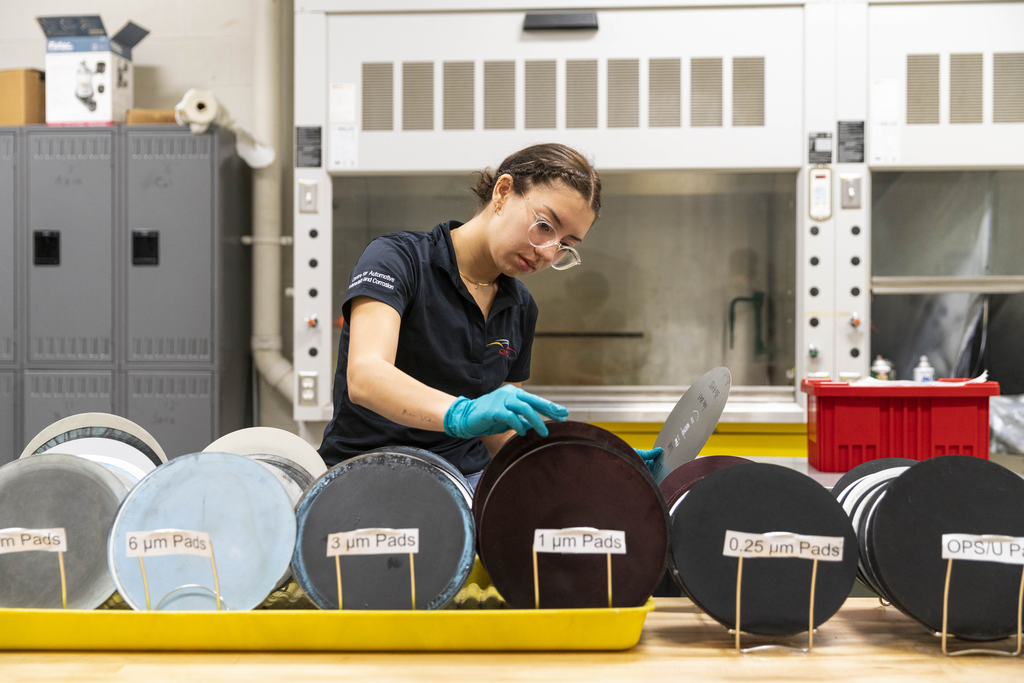
By the numbers
Interactions with RCIs:

2,182
FACULTY
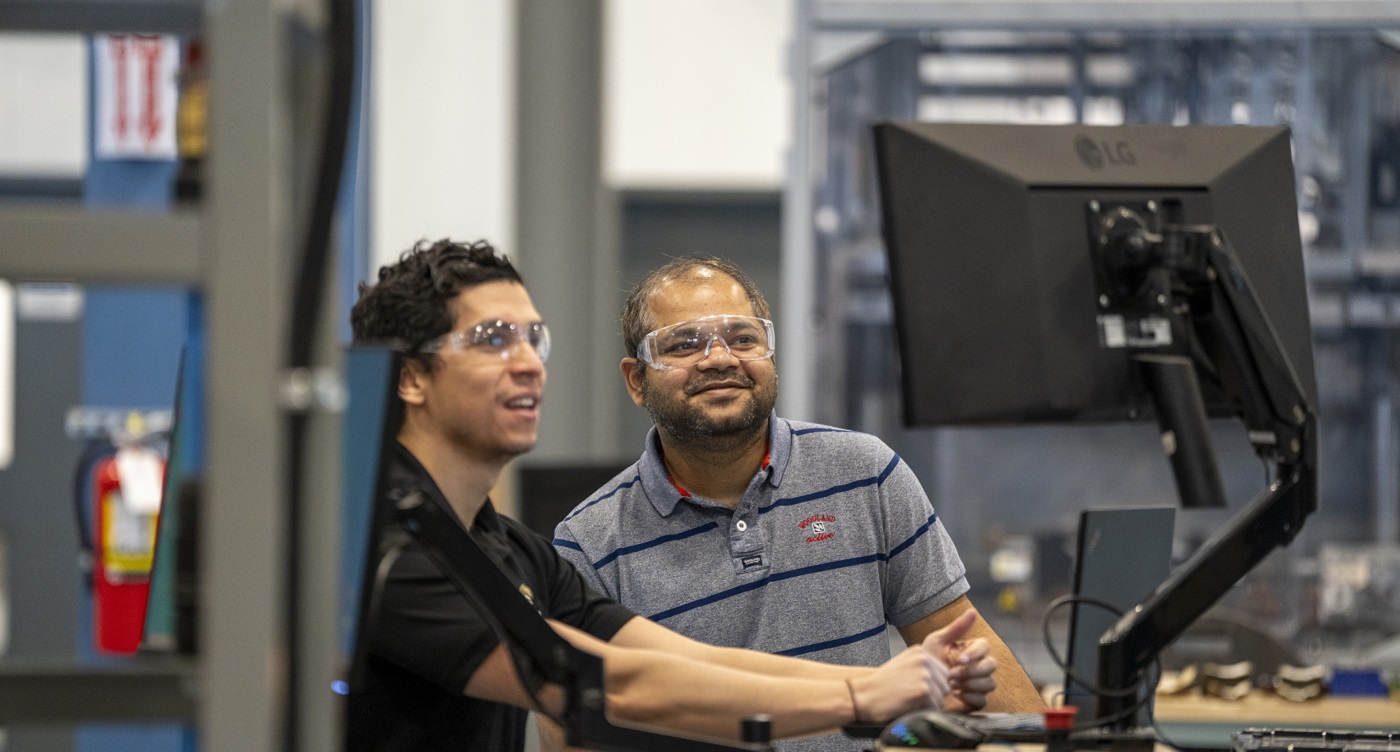
419
POSTDOCTORAL FELLOWS

2,390
GRADUATE STUDENTS
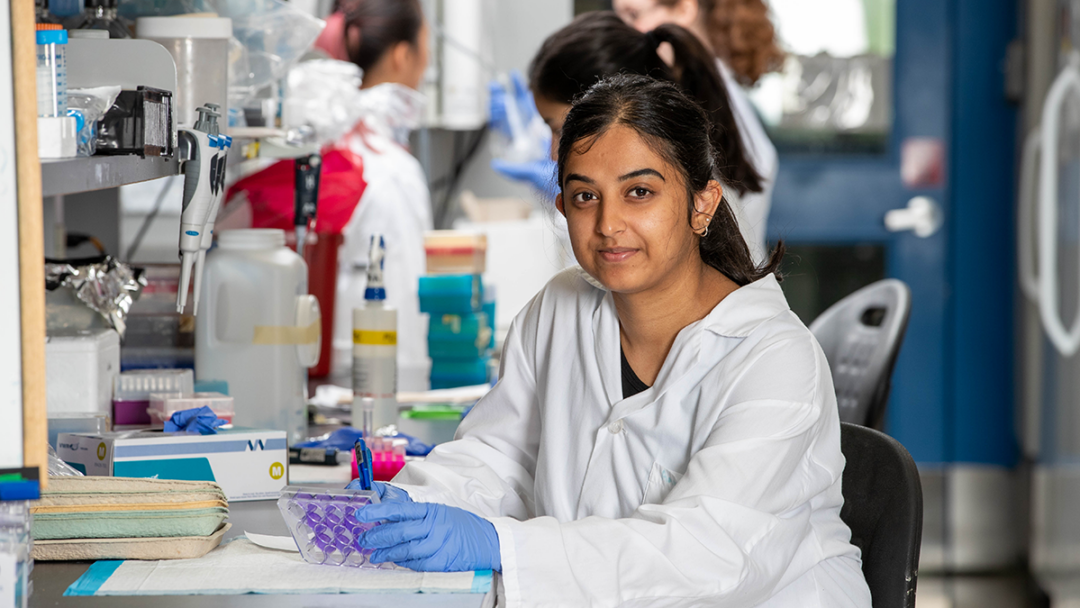
2,159
UNDERGRADUATE STUDENTS
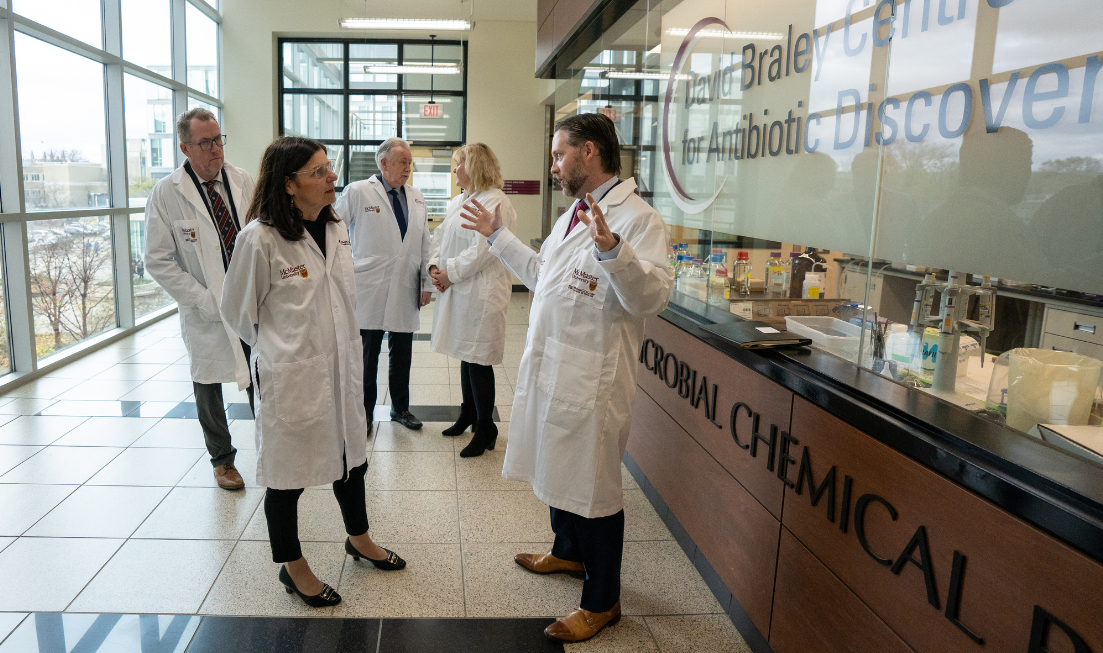
2,950
OTHER ACADEMIC RESEARCHERS

999
OTHER NON-ACADEMIC RESEARCHERS
By the numbers
Enabled by RCIs:
3,114
PEER-REVIEWED JOURNAL PUBLICATIONS
743
CONFERENCE PROCEEDINGS
1,563
CONFERENCE PRESENTATIONS
318
GRADUATE DEGREE COMPLETIONS
585
UNDERGRADUATE SENIOR PROJECTS
524
REPORTS FOR EXTERNAL PARTNER ORGANIZATIONS
62
IP DISCLOSURES
54
PATENTS
808
LICENSES TO EXTERNAL ORGANIZATIONS

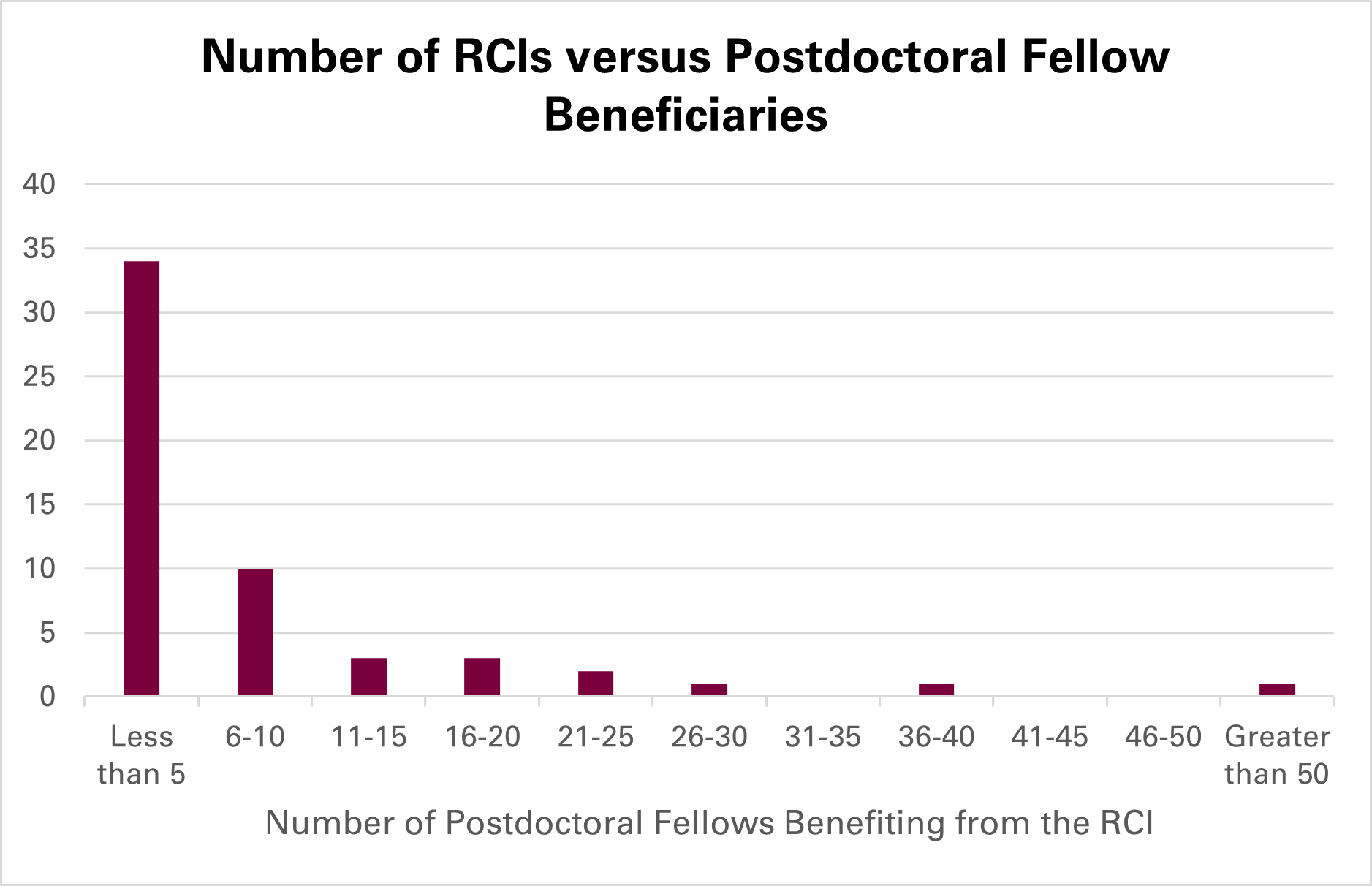


Research Impact & Influence
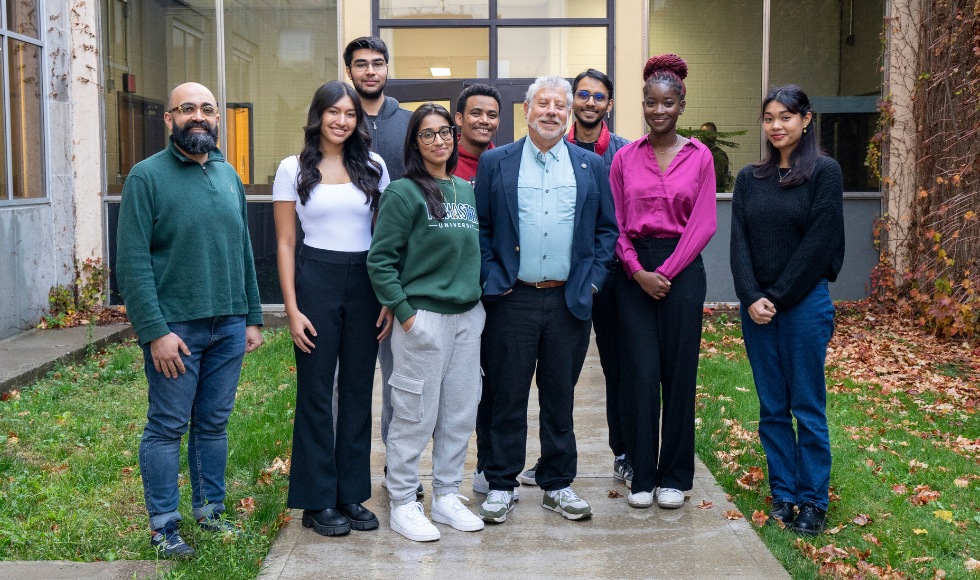
Empowering future generations of diverse entrepreneurs CRCE website
McMaster’s newest research centre, the Centre for Research on Community Oriented Entrepreneurship (CRCE), is working with communities across the globe to educate, inspire and empower entrepreneurs. Built on research initiated by business professor Benson Honig’s virtual incubator, the Reframery, the CRCE aims to support marginalized and minority persons in examining problems creatively to foster innovative business solutions.
Since its launch in 2023, the Centre has engaged over 25 McMaster undergraduate students, graduate students and faculty members. Members have worked with marginalized and refugee micro-entrepreneurs in Poland, Kenya, Brazil, Canada and the U.S. to research, design and deliver entrepreneurial education programs. The Centre develops tool kits, manuals and replicable models for virtual incubators – online spaces and e-learning platforms where entrepreneurs can access educational resources and cultivate connections.
The CRCE has collaborated with six cohorts to date to deliver programs that help innovators take their ideas from conception to reality and grow successful businesses that enhance their quality of life and community health and well-being. Members of the CRCE are running a Train the Trainers program in Brazil to give individuals tools to promote creativity, innovation and entrepreneurial skills in their communities. The CRCE has plans to expand its work with non-governmental organizations (NGOs) and other community stakeholders in Hamilton, Canada and worldwide.
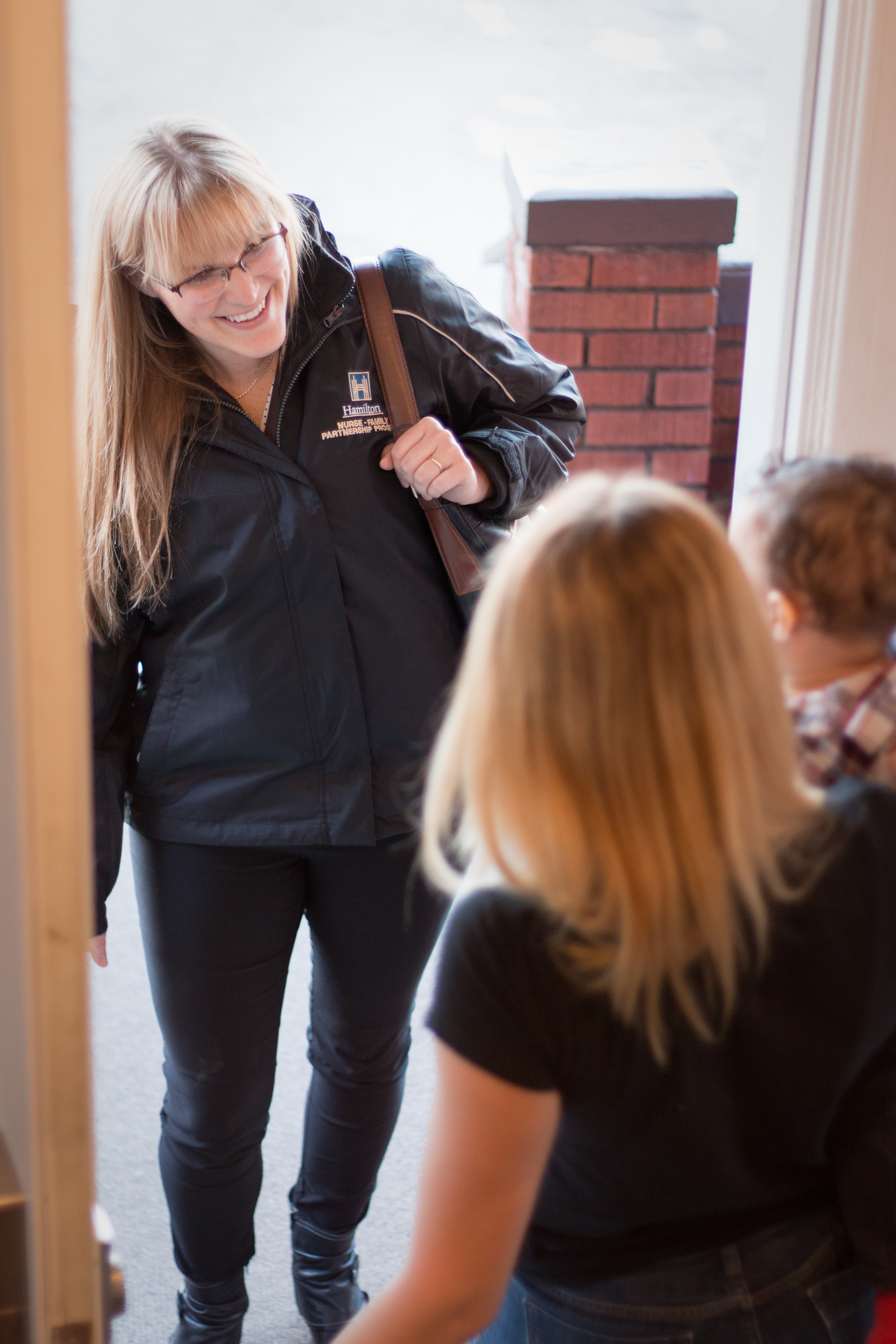
Evaluating a nurse home visitation program that supports Canadian families Offord Centre website
Researchers from the Offord Centre for Child Studies are evaluating a nurse home visitation program that supports pregnant individuals and new mothers as they navigate parenthood.
The Nurse Family Partnership (NFP) is an evidence-based home-visiting program that aims to improve the health, well-being and economic self sufficiency of families experiencing economic and social disadvantage. It pairs expecting mothers with a public health nurse, who provides ongoing support throughout pregnancy, infancy and toddlerhood, with a focus on promoting and teaching positive health and development behaviours between first-time parents and their children.
The program was originally developed and implemented in sites across the United States. Leaders at the Offord Centre, along with collaborators at Simon Fraser University, have been spearheading studies for over a decade to adapt, pilot, and evaluate the program in Ontario and British Columbia, with the aim of making it widely available to families across Canada.
The Offord Centre has played a critical role in adapting NFP for delivery through public health units and developing the program to meet the needs of Canadian families. This has included the development of national NFP visit guidelines and resources that public health nurses now use daily to deliver the program to families. In Ontario, the research team also developed and piloted training curriculum in four public health units, which now serves as the foundational model of education that new nurses and supervisors complete across Canada. The Offord Centre continues to play a central role in NFP’s development and expansion, so that more Canadians can access the program and develop skills to support their children’s health and well-being safely and sensitively.

Preparing young engineers for careers in the automotive industry CAMC website
A new educational initiative developed by the Centre for Automotive Materials and Corrosion (CAMC), in partnership with provincial and industry partners, is introducing the next generation of skilled professionals to careers in the automotive sector.
In 2023, CAMC partnered with the Ontario Council for Technology Education (OCTE) – as part of the OCTE’s Future Forward program – to launch province-wide educational programming focused on skills-training within the automotive and mobility sector. CAMC’s experts in materials and manufacturing supported the development of curriculum that encourages elementary and high school students to explore careers in Canada’s world-leading automotive industry.
Thanks to $500,000 in support from the Ontario Vehicle Information Network, the program was successfully rolled-out to 16 school boards and over 10,000 students across the province. Programming focused on a wide variety of core and emerging topics of interest in the automotive industry, from autonomous and electrified vehicle design and manufacturing to mobility planning and infrastructure.
CAMC also hosted an in-person workshop at McMaster for over 200 high school students, who participated in hands-on activities focused on developing in-demand technical skills in automotive research and industry. With a track record of student success and excellence in research and training, CAMC is equipping future STEM leaders with the fundamental knowledge and applied skills they need to succeed.
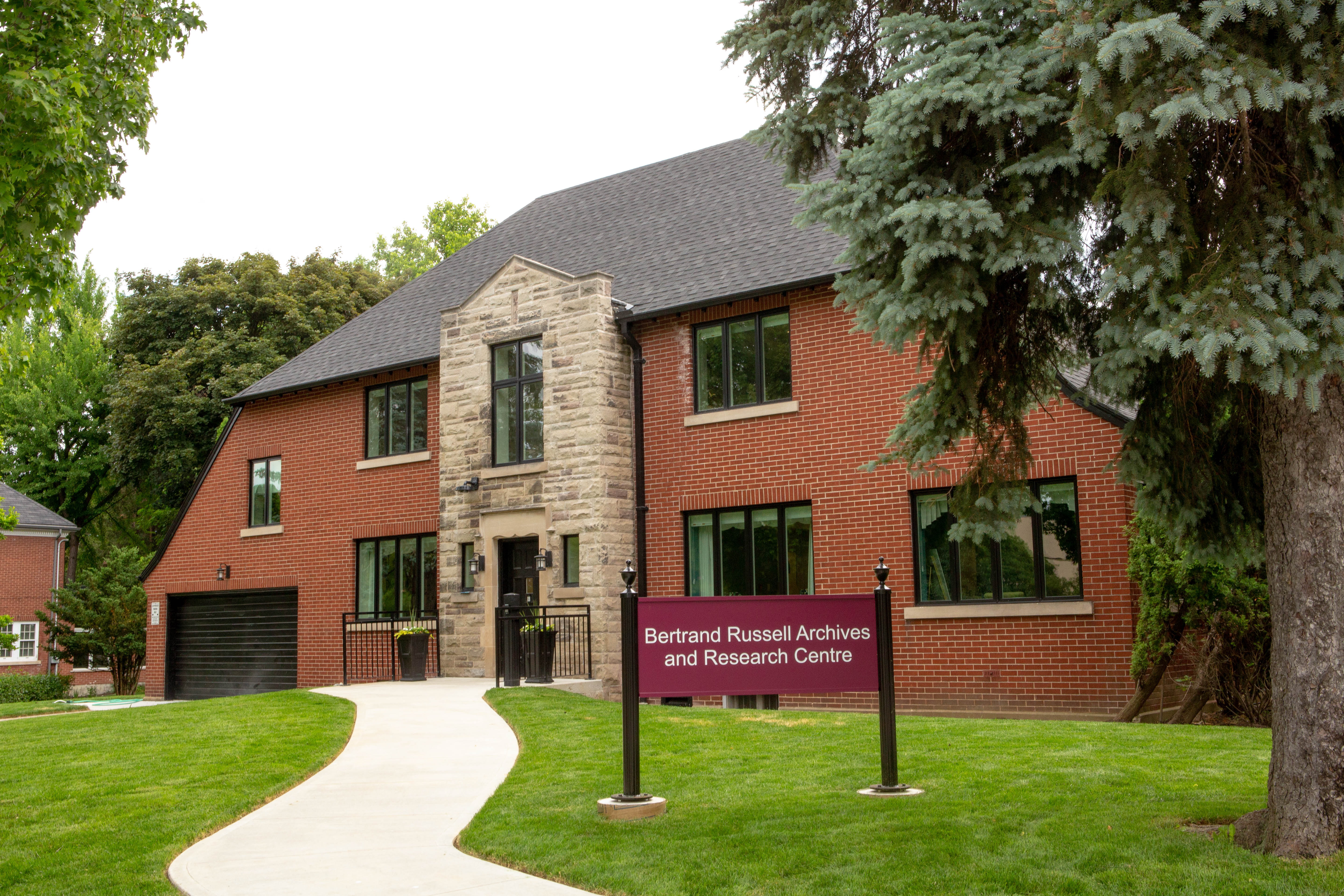
Bertrand Russell journal introduces new audiences to the philosopher’s work BRRC website
The Bertrand Russell Research Centre (BRRC) is the world’s foremost institute conducting and promoting scholarship on Bertrand Russell – one of the twentieth century’s most important thinkers. McMaster is home to the Bertrand Russell Archives, the largest collection of Russell material in the world. The Archives enable global scholarship on Russell’s writings on logic, science, mathematics, political and social theory, religion, education and more.
The BRRC is focused on two ongoing projects, the Collected Papers and the Collected Letters, which collate Russell’s influential writings and letter correspondence for public consumption. The Centre also publishes Russell: The Journal of Bertrand Russell Studies semi-annually. The scholarly journal is devoted to all aspects of Russell’s thought, life, times and influence.
After 50 years of publishing Russell in-house, the journal moved to publisher Johns Hopkins University Press in 2023 and is now carried on the widely used digital platform Muse. A new team of editors – Andrew Bone, BBRC Senior Research Associate, and Gülberk Koç Maclean, Adjunct Professor of Philosophy – took over for the journal’s original editor and Russell archivist, Kenneth Blackwell. This shift to Johns Hopkins University Press is bringing the journal into countless new libraries and institutions, and to new audiences worldwide who are interested in learning more about the philosopher’s life, ideas and legacy.
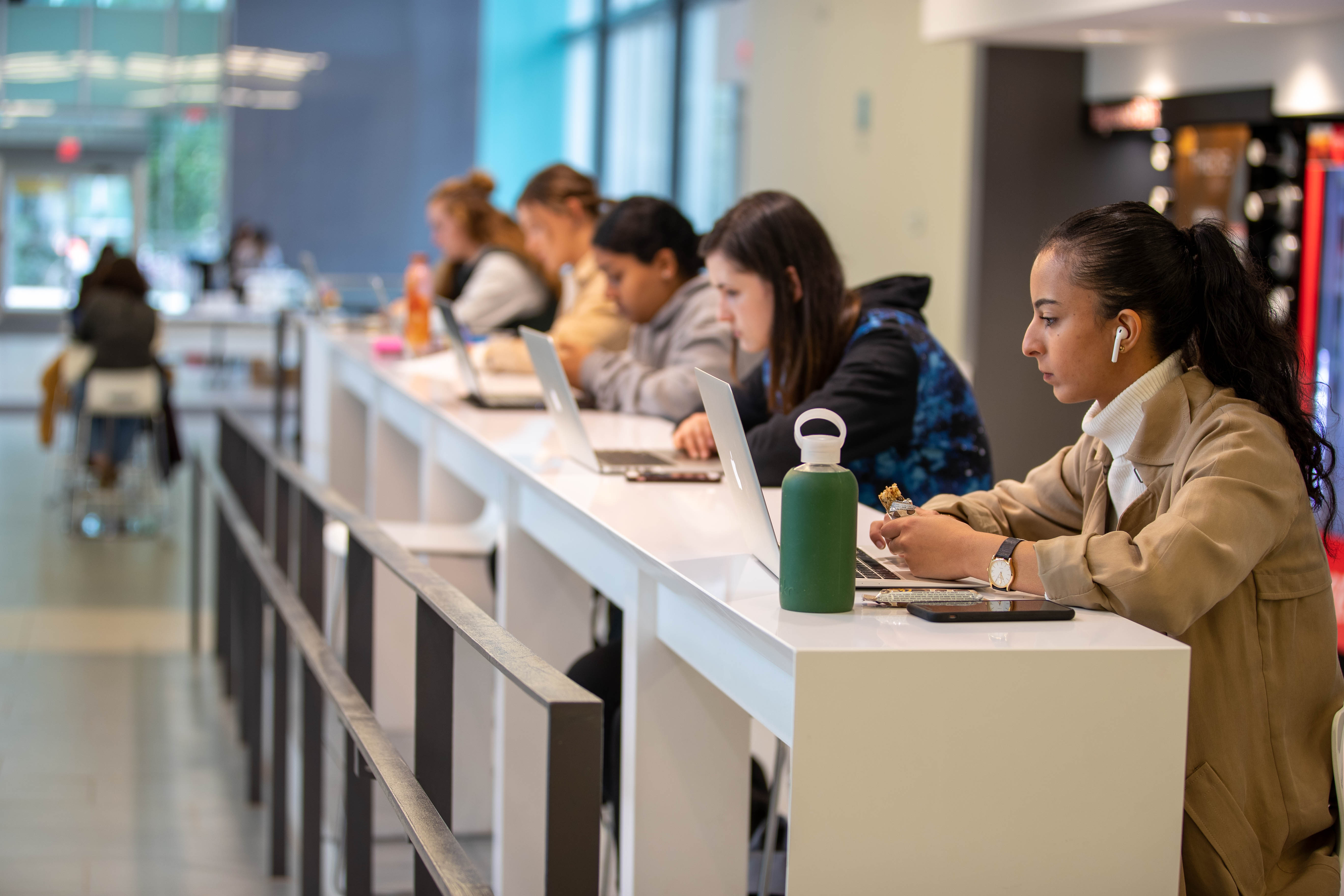
Advancing social research in the digital age Digital Society Lab website
The Digital Society Lab is spearheading research on the complex societal transformations that accompany our digital world – from digital currencies to online political advertising, AI and the spread of disinformation.
Consisting of linguists, statisticians, engineers, political scientists and computational social scientists from around the world, the Lab examines the social, political, and economic impacts of digital technologies while harnessing the potential of these tools to advance scientific and social innovation.
The Lab is currently enlisting a new web development team to support the creation of digital products that address some of our most pressing global challenges. With dangerous disinformation campaigns on the rise on social media, the Digital Society Lab is using AI-powered countermeasures to push back. The Lab is leveraging high-performance computing, algorithms and machine learning technologies to examine how disinformation and hateful content spreads through social media networks, with the goal of developing advanced technological solutions that can help detect and filter fake news.
As new digital technologies continue to reshape our lives, the Digital Society Lab is leading social tech research and innovation to promote a fair and healthy digital age, while training the next generation of scholars and policy leaders.

Building a roadmap for affordable housing in Hamilton MIHE website
The McMaster Institute for Health Equity (MIHE) is working with community and government partners to develop safe, accessible and affordable housing solutions amidst Hamilton’s housing crisis.
Leaders at the MIHE are working closely with the City of Hamilton and the Canadian Housing Evidence Collaborative (CHEC) – an outgrowth of MIHE’s Housing and Health Equity stream funded by the Social Sciences and Humanities Research Council and the Canada Mortgage and Housing Corporation to implement a Housing Sustainability and Investment Roadmap.
The Roadmap will guide the City’s strategic response to the current crisis in housing affordability and homelessness. Its ‘whole-of-Hamilton’ approach ensures that multiple levels of government, City departments, community stakeholders and academic researchers can work collectively to improve housing conditions and housing accessibility in Hamilton.
As a hub for interdisciplinary research on health equity, MIHE lent their expertise to the development of the Roadmap. The Institute provided and analyzed the latest housing data to guide its focus. In 2023, Dr. Jim Dunn, Director of MIHE and CHEC, appeared before the Hamilton City Council to co-present the Roadmap. It has since been adopted and a Housing Secretariat was established to coordinate collaborative research and knowledge mobilization projects led by the Roadmap stakeholders. The Roadmap also helped inform a series of consultations led by CHEC for the Canadian Ministry of Infrastructure, Housing and Communities that culminated in Canada’s Housing Plan, presented in the 2024 federal budget.
MIHE continues to play a central role in actioning the Roadmap and advancing evidence-based solutions that address Hamiltonians’ diverse housing needs.

Planting 1,000 trees to tackle climate change and advance environmental research MCCC website
The McMaster Centre for Climate Change (MCCC) is leading an innovative tree-planting project designed to combat climate change and provide unique learning and research opportunities in environmental science. Led by researchers at the MCCC, the McMaster Carbon Sink Forest initiative is developing a model of a carbon sink forest on a one-hectare plot of land in west Hamilton. With the help of faculty, students and community volunteers, the Centre has planted over 1,000 trees, which sequester – or absorb – atmospheric carbon dioxide to help mitigate the impacts of climate change.
In 2023, the Centre organized two tree planting events in collaboration with community partners. Over 150 McMaster and Hamilton community members participated in the planting of over 500 trees. MCCC researchers continuously monitor how much carbon dioxide is being pulled out of the atmosphere by each tree and collect ecological data to monitor the trees’ long-term health. This data, along with the Centre’s experience in growing the forest, will be shared with researchers across Canada and around the world who are growing similar forests to
combat climate change.
The McMaster Carbon Sink Forest has received international attention. It was shortlisted for the David Suzuki Foundation’s Future Ground Prize in 2022. The Centre is currently building on the success of the project to establish an urban Greenhouse Gas Observatory at the site. The Observatory will act as an outdoor living learning lab for McMaster faculty and students.
Bertrand Russell Research Centre
Director: Dr. Alex Klein
Biointerfaces Institute
Co-Directors: Dr. John Brennan and Dr. David Latulippe
Biomedical Engineering and Advanced Manufacturing
Director: New Director to be confirmed
Brockhouse Institute for Materials Research
Director: Dr. Alex Adronov
Canadian Centre for Electron Microscopy
Director: Dr. Andre Phillion (Acting)
Can-Child: Centre for Childhood Disability Research
Co-Directors: Dr. Olaf Kraus de Camargo and
Dr. Briano Di Rezze
Centre for Advanced Research on Mental Health and Society
Director: Dr. Marisa Young
Centre for Advanced Research in Experimental and Applied Linguistics
Director: Dr. Ivona Kucerova
Centre for Ancient Numismatics
Director: Dr. Spencer Pope
Centre for Automotive Materials and Corrosion
Director: Dr. Joey Kish
Centre for Clinical Neuroscience
Director: Dr. Benicio Frey
Centre for Community-Engaged Narrative Arts
Co-Directors: Dr. Lorraine York and Dr. Daniel Coleman
Centre for Discovery in Cancer Research
Director: Dr. Shelia Singh
Centre for Emerging Device Technologies
Director: Dr. Jonathan Bradley
Centre for Excellence in Protective Equipment and Materials
Director: Dr. Ravi Selvanganapthy
Centre for Health Economics and Policy Analysis
Director: Dr. Jean-Eric Tarride
Centre for Human Rights and Restorative Justice
Director: Dr. Juanita De Barros
Centre for Mechatronics and Hybrid Technologies
Director: Dr. Saied Habibi
Centre for Metabolism, Obesity, and Diabetes Research
Co-Directors: Dr. Katherine Morrison and
Dr. Gregory Steinberg
Centre for Networked Media and Performance
Director: Dr. Christine Quail
Centre for Peace Studies
Director: Dr. Chandrima Chakraborty
Centre for Research in Micro- and Nano-Systems
Director: Dr. Jamal Deen
Centre for Research on Community Oriented
Entrepreneurship
Director: Dr. Benson Honig
Chanchlani Research Centre
Director: Dr. Sonia Anand
David Braley Centre for Antiboitic Discovery
Director: Dr. Matthew Miller
Digital Society Lab
Director: Dr. Clifton van der Linden
Escarpment Cancer Research Institute
Director: Dr. Gregory Pond
Farncombe Family Digestive Health Research Institute
Director: Dr. Steve Collins
Gilbrea Centre for Studies in Aging
Director: Dr. Anthea Innes
Institute on Ethics and Policy for Innovation
Director: Dr. Claudia Emerson
Institute on Globalization and the Human Condition
Director: New Director to be confirmed
L.R. Wilson Institute for Canadian History
Director: Dr. Ian McKay
Labarge Centre for Mobility in Aging
Director: Dr. Parminder Raina
Lewis and Ruth Sherman Centre for Digital Scholarship
Director: Dr. Andrea Zeffiro
MacData Institute
Director: New Director to be confirmed
McMaster Advanced Control Consortium
Director: Dr. Christopher Swartz
McMaster Centre for Climate Change
Director: Dr. Altaf Arain
McMaster Centre for Scholarship in Public Interest
Director: Dr. Henry Giroux
McMaster Centre for Software Certification
Director: Dr. Richard Paige
McMaster Centre for Transfusion Research
Co-Directors: Dr. Donnie Arnold and Dr. Issac Nazy
McMaster Digital Transformation Research Centre
Director: Dr. Milena Head
McMaster Immunology Research Centre
Director: Dr. Carl Richards
McMaster Indigenous Research Institute
Director: Dr. Savage Bear
McMaster Institute for Energy Studies
Director: Dr. Dave Novog
McMaster Institute for Music and the Mind
Director: Dr. Laurel Trainor
McMaster Institute for Research on Aging
Director: Dr. Parminder Raina
McMaster Institute for Research on Aging | Dixon Hall
Director: Dr. Parminder Raina
McMaster Institute for Transportation and Logistics
Director: Dr. Motaz Mohamed
McMaster Institute for Health Equity
Director: Dr. Jim Dunn
McMaster Manufacturing Research Institute
Director: Dr. Stephen Veldhuis
McMaster Midwifery Research Centre
Director: Dr. Beth Murray-Davis
McMaster Origins Institute
Director: Dr. Jonathan Stone
McMaster Physical Activity Centre of Excellence
Director: Dr. Stuart Phillips
McMaster Steel Research Centre
Director: Dr. Joe McDermid
McMaster University Centre for Buddhist Studies
Director: Dr. James Benn
McMaster University Centre for Effective Design of Structures
Co-Directors: Dr. Wael El-Dakhakhni and Dr. Mike Tait
Michael G. DeGroote Centre for Medicinal Cannabis Research
Director: Dr. James MacKillop
Michael G. DeGroote Cochrane Canada Centre at
McMaster
Director: Dr. Holger Schunemann
Michael G. DeGroote Institute for Infectious Disease Research
Director: Dr. Matthew Miller
Michael G. DeGroote Institute for Pain Research and Care
Director: Dr. Norm Buckley
Michael G. DeGroote National Pain Centre
Director: Dr. Norm Buckley
Michael Lee-Chin and Family Institute for Strategic Business Studies
Director: Dr. Ron Balvers
Offord Centre for Child Studies
Director: Dr. Stelios Georgiades
Population Health Research Institute
Director: Dr. Salim Yusuf
Schroeder Allergy and Immunology Research Institute
Director: Dr. Susan Waserman
Spark: A Centre for Social Research Innovation
Director: Dr. Michelle Dion
Statistics Canada Research Data Centre at McMaster
Director: Dr. Michael Veall
Thrombosis and Atherosclerosis Research Institute
Director: Dr. Jeffery Weitz

